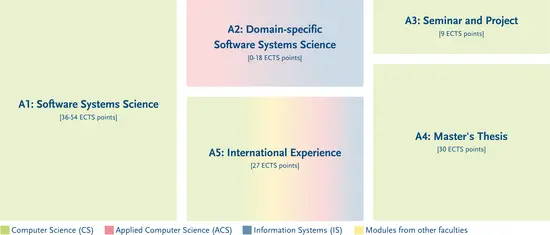Structure and Curriculum
The masters programme in International Software Systems Science (120 ECTS) offers advanced graduate level studies (Bologna 2nd cycle) that build on a prior six semester bachelors degree in Software Systems Science (180 ECTS) or a closely related field of study. The programme offers the experience of an optional study abroad and/or an optional industrial internship in an international context. Upon successful completion, students have acquired the minimum 300 ECTS required for a continuing 3rd cycle post-graduate training following the Bologna scheme.
The study programme provides wide-ranging elective options in five functional or thematic module groups A1-A5 described below. Within these module groups you may select an area of specialization in line with your own interests in four fields of Software Systems Science:
- S1: Distributed and Mobile Systems
- S2: Software Analysis and Verification
- S3: Service-oriented Architectures
- S4: Communication Systems and Protocols
You can form a degree specialisation by selecting the masters thesis (module group A4), one project or one seminar (in module group A3) and elective modules of at least 18 ECTS (in module groups A1, A2) in your desired focal area S1-S4. Your area of specialisation will be documented in your final MSc degree certificate.
This module group covers four focus areas, of which at least one module must be selected. In addition, several advanced-level modules in foundations of computer science, communication systems & computer networks, mobile soft-ware systems, software technology & programming languages as well as distributed systems can be selected upon choice.
Focus area and associated electives:
- Distributed and mobile systems (e.g. Functional Programming of Reactive Systems, Advanced Information Security and Privacy, Database Systems for modern CPU)
- Software analysis and verification (e.g. Automation of Logical Reasoning, Introduction to Functional Programming, Universal Logic & Universal Reasoning)
- Service-oriented architectures (e.g. Algorithms, Advanced Data Management, Operating Systems Engineering, Virtualization)
- Communication systems and protocols (e.g. Data Streams and Complex Event Processing, Introduction to Differential Privacy, Applied Software Verification)
This module group comprises optional advanced-level modules from applied fields of computer science related to Software Systems Science such as IT-management, energy efficient systems, smart environments, human-computer interaction, cognitive systems, computing in the cultural sciences and social networks.
In this module group you will attend a seminar and run a project to deepen your understanding of the topics covered by the module groups A1 and A2. The topics addressed in the seminar and project highlight specific issues in the areas of computer science, applied computer sciences and information systems related to Software Systems Science. In a seminar you will conduct independent literature research, deliver an oral presentation and write a short essay. In the hands-on project you have the opportunity to practice your know-how individually or in teams.
The master’s thesis comprises the conduct of independent research leading to a written dissertation on an advanced topic related to Software Systems Science. This individual work is supervised and guided by a member of the faculty’s academic staff.
Here you get the opportunity to enrich your studies through a distinctively international academic or industrial experience. You can do this at three levels of “ambition”:
Full Study Abroad:
You spend at least one semester as study time abroad, for instance, at one of our partner universities. There you may select study abroad modules from the graduate level offerings of the partner institution. It is necessary that the topics fall within the area of Software Systems Science and are pre-arranged through a learning agreement. The total amount of credit points obtained abroad should be at least 30 ECTS.
International Internship:
What if you cannot bring home the required 30 ECTS from abroad or simply do not want to study abroad? Then you have the option of accomplishing an internship in an international context, preferrably abroad, that covers topics of the occupational field of Software Systems Science. This internship must have a volume of at least 12 ECTS credit points, corresponding to 360 working hours in a foreign or internationally acting domestic company or research institute.
More Modules at the University of Bamberg:
Perhaps you like Bamberg University so much that you neither wish to study abroad nor embark on a traineeship in an international context. In this case you have the option to accumulate the required 30 ECTS credit points of this module group A5 by selecting additional Bamberg modules from the list specified in the module groups A1 and A2. These additional modules must not have been chosen previously.
Whatever option you choose you may also include foreign language modules (such as German if this is not your native language) towards your A5 requirement. Recognition is limited to a maximum of 18 ECTS credit points.
